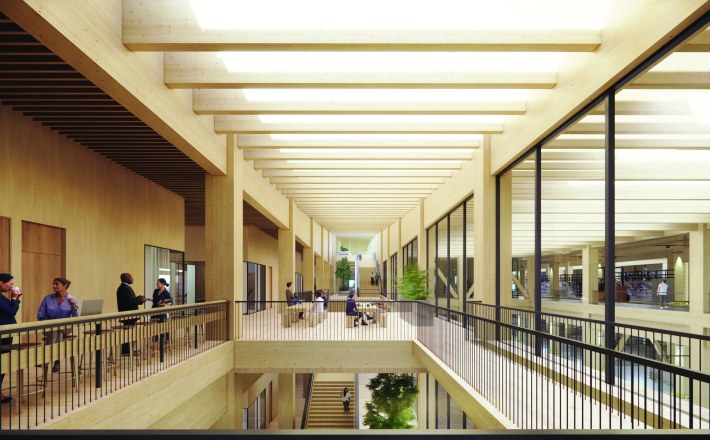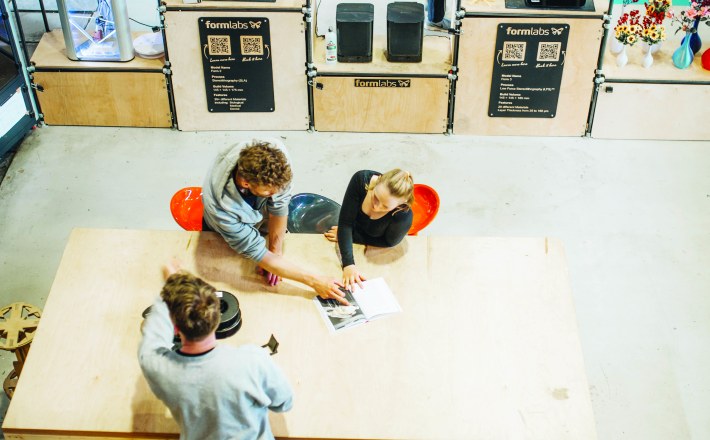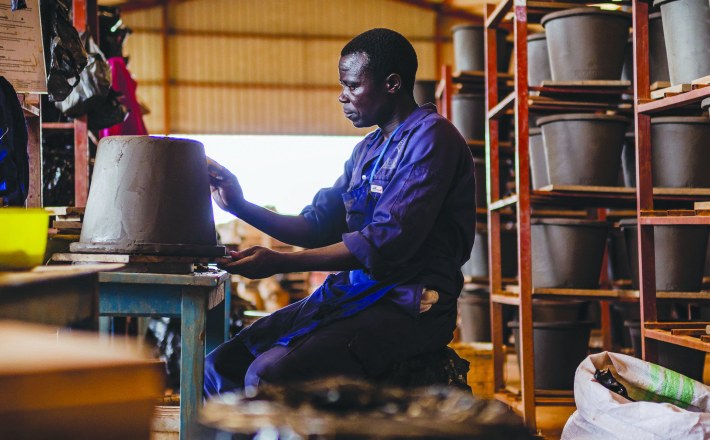Zero Waste
A restaurant produces an average of 70,000 tons of waste per year. This doesn’t have to be the case: a group of forward-thinking chefs around the world is trying to save resources in order to do good for the environment. Zero-waste is the name of the new movement that has recently reached the German capital too. The restaurant Frea is breaking new ground in Berlin.
With homemade mint kefir, potato peels in mushroom broth and a composting machine called Gersi. COMPANION paid a visit to the plant-based restaurant.
In some kitchens the centrepiece is a sous vide cooker, in others it’s a high-performance salamander grill. Here they are proud of Gersi. The composting machine stands in the back section of the restaurant, separate from the dining area, but still positioned in such a way that anyone who’s interested can take a look. The principle is simple: food waste goes in at the top and humus soil fertilizer comes out the bottom. Ultimately this ends up back on the fields of the farmers who supplied the ingredients in the first place. It’s what’s referred to as the circular economy. David Suchy likes to take the time to explain these things. In March this year he opened Frea, Germany’s first zero-waste restaurant. The restaurant operates based not only on the principles of sustainability and waste prevention, but also restricts itself to using exclusively animal-free ingredients.

It’s Monday midday, just before lunch. People are happily enjoying the heatwave in Berlin until climate change is mentioned. Despite it being 35 degrees in the shade, some customers have seated themselves at the tables overlooking Torstrasse, the rest retreat inside. The interior is spacious and light, featuring a lot of natural materials. The first thing that stands out is the baby blue bar counter and, to its right, an open-plan kitchen. The walls are unplastered, as you’d expect in Berlin Mitte, and small tables are set with linen napkins. Embroidered cushions in earthy colours line the wooden benches and gold desk lamps give the place a touch of retro glamour. Plants are everywhere—in pots and hanging from the ceiling. Bossa Nova plays in the background. Only the fact that the ceiling lamps are on in the middle of the day taints the image of an ecologically impeccable life.
David looks as if he’s just got back from holiday. He has chin-length dark blonde hair and a lean build. As he extends a wiry forearm in greeting, he asks us to wait a few minutes. He’s in the middle of a workshop for restaurateurs who have travelled from all over Germany. Occasional words can be heard above the hum of the fans set out around the room: ‘delicious’, for example, ‘full taste’ and again and again the catchphrase that it’s all about—‘zero-waste’.

The world is changing. Images of oceans contaminated by plastic and the news that we consume the equivalent of a credit card-sized amount of microplastics every week have had an effect. After years of reckless hedonism, environmental awareness is suddenly trendy. For many people, it has become second nature to buy organic products and air travellers are rapidly being called to account. But that’s no longer enough. Zero-waste means attempting to produce as little waste as possible. It’s about sustainability, conserving resources and avoiding any kind of waste. If you think more radically, then you avoid consumption in general. This subject is particularly relevant in gastronomy. Every day, thousands of tonnes of food end up in the bin, either because they don’t meet certain requirements, or because of incorrect calculations. Along with packaging, an average restaurant produces 70,000 kilograms of rubbish per year. Some are beginning to rethink their strategy. And others, like Frea, are more radical. ‘Our aspiration is to use everything,’ explains David, once he has released his workshop participants for lunch. This applies in two respects. Firstly, he only buys primary products which either arrive at the restaurant unpackaged or whose packaging can be completely recycled. Coffee, for example, comes from the Berlin collective Flying Roasters in large metal tins, while rice, flour and buckwheat come in reusable paper bags. Secondly, the zero-waste philosophy also applies to Frea’s menu. Everything is homemade, from sourdough bread and mint kefir to chocolate and a delicious hazelnut milk. The so-called root-to-stalk principle applies: potato peelings are used to refine mushroom stock, orange peel becomes a cake filling. Anything customers leave on their plates goes in the aforementioned composting machine.
Our aspiration is to use everything.
David Suchy
In 2016, David decided to give up meat, which was followed one year later by all animal products. At about the same time, he came into contact with the zero-waste movement, which at the time was little known, through New York blogger Lauren Singer. The Berlin native quickly relished the idea of an invisible ecological footprint. ‘In everyday life, it’s no problem at all. Instead of toothpaste I use toothpaste tablets and a bar of soap for washing. If I want to moisturise, I opt for coconut oil.’ To share his experiences with others, he founded his own YouTube channel, Johnny and the Food, and supported a vegan catering company. Then he met a kindred spirit in Jasmin Martin, now 29, who was working at a management consultancy. The couple began dreaming of opening a restaurant together. They looked at forty locations and finally settled on one in central Berlin. The name was inspired by Freya, goddess of agriculture and fertility in Norse Mythology, and Frigg, goddess of the hearth. The conceptual model came from Silo in Brighton, England, whose proprietor, Douglas McMaster, was one of the first people to transfer the idea of a waste-free life to gastronomy in 2015. David spent ten days there as a trainee—and subsequently brought sous-chef Halfdan Kluften back with him to Berlin.

Halfdan, with his peroxide-blonde short hair and prominent cheekbones, prepares the lunch. The menu changes every week. As well as salad and flatbread with a trio of dips, there is also a pasta dish and a vegetable dish for the main course. If you are still hungry, you can order dessert—today, for example, there’s an apricot sorbet. Frea also recently started opening in the evenings as well. On the dinner menu there’s kohlrabi linguine with roasted shiitake mushrooms, broccoli and cream of tomato, a plate of pickles and a potato terrine with portobello mushrooms. These can be accompanied by some homemade kombucha or natural wines by the likes of Enderle Moll or Claus Preisinger. Well, for David’s customers, at least—the 32-year-old proprietor decided to give up drinking two years ago to see how his body reacted. The verdict? ‘I can highly recommend it.’ Listening to him talk, you get the impression of a thoroughly efficient life—he speaks of ‘drive.’ Getting up early, being present in the restaurant, managing the Instagram account, holding workshops, always being contactable. If customers want to reserve a table, he answers the telephone personally. And he’s constantly driven by the desire to not consume anything which is harmful to the environment. What does he find hard to give up? ‘Nothing,’ he answers with a penetrating look from his hazel eyes. What does he do if he gets hungry when he’s out? ‘I always have supplies with me in Tupperware boxes.’ He’s even well-prepared on holiday. Last summer he went to the Baltic Sea with a boot full of supplies. Wait—he took his car instead of the train? ‘Nobody’s perfect.’

In any case, nobody could find fault with the furnishings of the restaurant. The lamps above the bar are made from fungal cells. Almost all the furniture comes from Ebay classified ads. One of the pictures on the wall was welded together from the plastic waste generated during the renovation work. There’s certainly no sign of any paper napkins or takeaway coffee cups.
As well as Silo in Brighton, other addresses have also signed up to the zero-waste philosophy. Nola in Helsinki for example, or Isla Coffee in Berlin’s Neukölln district. With Frea, David is taking it one step further: ‘We are the world’s first vegan zero-waste restaurant.’ Food, he says, can drive change. ‘The psyche works on every visit’—and that’s despite the fact that there’s no mention of the philosophy outside the restaurant. ‘I am always happy to answer questions,’ the 32-year old entrepreneur says. ‘On occasion, there’s even a farewell hug.’ For him, having so much enthusiasm has to do with good nutrition. ‘To be honest, I eat all the time. I have porridge with fruit first thing after getting up, then during the morning I taste the current lunch dishes, and in between I snack on sourdough bread. In the afternoon at 4.30 there’s a staff meal, followed by items from the evening menu. If I think about it, my body is a composting machine 2.0.’

Even More Zero Waste
Instock, Amsterdam
An advanced course in dumpster diving—ingredients come from what a lorry collects on its rounds.
instock.nl
Nolla, Helsinki
Scandinavia’s first zero-waste restaurant doesn’t even have a single bin.
restaurantnolla.com
Isla Coffee, Berlin
Peter Duran makes cheese and yoghurt out of left-over frothed milk and a legendary bread pudding from leftover cinnamon buns.
instagram.com/islacoffeeberlin
Haven’s, New York
A restaurant, cookery school and event location in one. Meat is also served here, although only the cuts which usually end up in the bin.
havenskitchen.com
Rovi, London
This restaurant, which belongs to the acclaimed chef Yottam Ottolenghi, sources its food from an organic farm in Sussex, makes vinegar from vegetable scraps and heats the dining room with energy from the kitchen.
ottolenghi.co.uk/rovi




